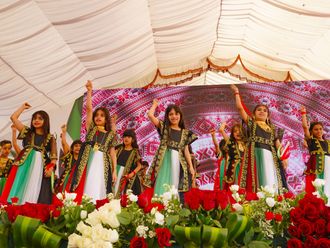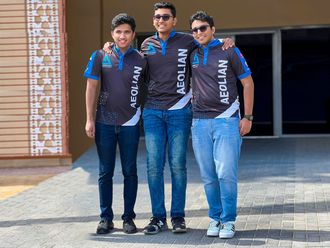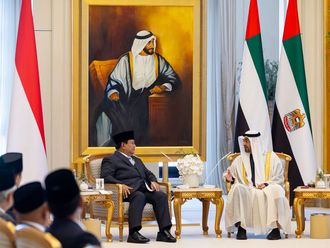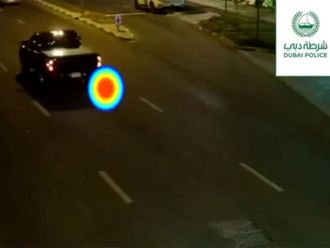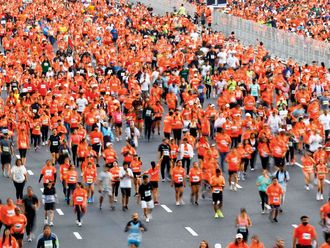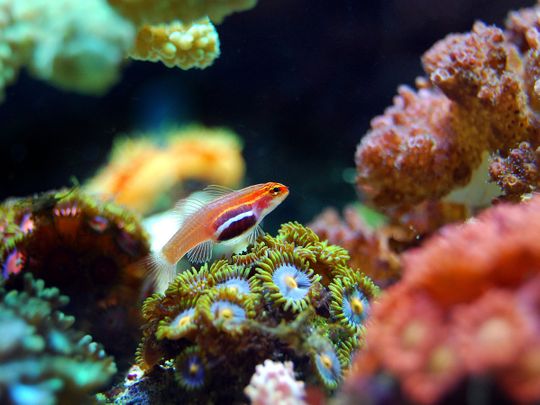
Dubai: Dubai has announced the launch of the Dubai Reef project, one of the world’s largest marine reef developments, marking a pioneering step in the journey towards ecological preservation.
In line with the directives of Sheikh Hamdan bin Mohammed bin Rashid Al Maktoum, Crown Prince of Dubai and Chairman of The Executive Council of Dubai, the Dubai Reef project will be led by the Dubai Department of Economy and Tourism (DET) and founding partner, the Regulatory Committee on Fishing of Living Aquatic Resources in Dubai, in cooperation with Dubai Chambers, the Ports, Customs and Free Zone Corporation (PCFC), and Nakheel.
The Dubai Reef project is a monumental endeavour, deploying artificial reef modules of various sizes, spanning a staggering 600 square kilometres of Dubai’s pristine waters. The meticulous design of these reefs exceeds 400,000 cubic meters in total volume, with an estimated capacity to capture over seven million tonnes of carbon annually. Beyond carbon capture, this project plays a pivotal role in coral reef habitat restoration, coastal protection and the revival of marine biodiversity along Dubai’s foreshore.
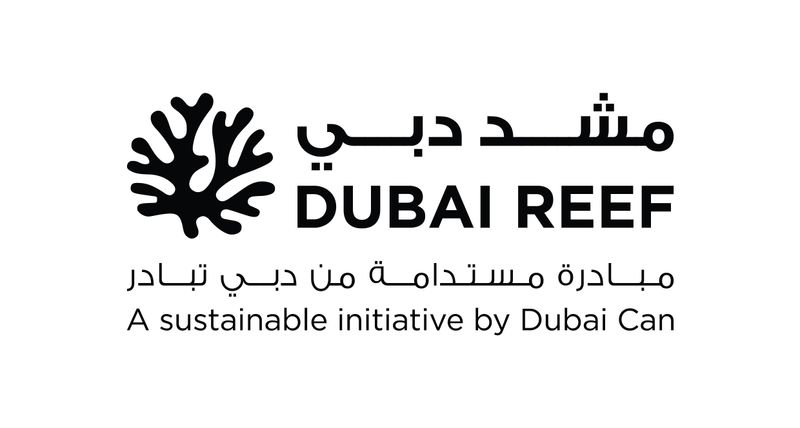
Key targets
The project is part of the city’s efforts to increase fish stocks, support sustainable fishing and contribute to boosting food security. Dubai Reef project will also play a vital role in reducing carbon emissions and increasing marine biodiversity. As the city continually strives to achieve the objectives outlined in the Dubai Economic Agenda, D33, to strengthen Dubai’s profile as a leading sustainable city, the landmark project is set to further consolidate the emirate’s position as one of the top three global cities.
Sheikh Hamdan highlighted that preserving the environment, safeguarding wildlife and promoting biodiversity stand as core priorities for the UAE, aligned with the strategic initiative to achieve climate neutrality by 2050. He also emphasised that safeguarding the continuity and quality of human life requires a concerted and intensified commitment to launching high-impact projects and championing the adoption of best practices that ensure environmental safety and sustainability for generations to come.
Critical importance
“Dubai recognises the critical importance of the environment and is fully committed to its preservation as a top strategic priority for ensuring a sustainable future for generations to come. The profound challenges posed by global climate change have exerted significant pressure on various forms of wildlife, and Dubai is strongly dedicated to playing a substantial role in mitigating these effects through initiatives that promote the sustainability of our natural environment, with particular emphasis on coral reefs. Coral reefs are a vital component in the protection of marine life and have both economic and environmental significance. We are pleased to see this promising project launched in Dubai, contributing to global efforts aimed at conserving coral reefs,” he added.
Citywide sustainability movement
The launch of the project coincides with the hosting of the 28th Conference of the Parties to the UN Framework Convention on Climate Change (COP28), which is being held at Expo City Dubai from November 30 to December 12. The Dubai Reef project stands as a testament to Dubai’s commitment, as exemplified by initiatives like the citywide sustainability movement, ‘Dubai Can’, in supporting marine life, enhancing marine biodiversity and its aspiration to establish itself as a leading global sustainable city.
Dubai Can project
‘Dubai Can’ was launched on 15 February 2022 by Sheikh Hamdan, along with the ‘Refill for life’ initiative, which aims to empower communities to reduce the use of single-use plastic water bottles. The ‘Refill for life’ campaign has successfully reduced the use of these bottles by over 15.5 million 500ml plastic water bottles since its launch.
The newly unveiled Dubai Reef project under ‘Dubai Can’ will not only further boost marine conservation but also significantly contribute to carbon sequestration, aligning perfectly with the themes and goals of COP28.
Reefing Dubai’s Coastlines: A Momentous Milestone
Helal Saeed Almarri, Director General of the Dubai Department of Economy and Tourism (DET), commented: “The Dubai Reef project will contribute towards advancing the goals set forth in the Dubai Economic Agenda, D33, with a key focus on developing our green economy and stimulating ancillary sector growth to support our ESG and the UAE NetZero 2050 goals. This initiative also emphasises the importance of our rich marine heritage, while further enhancing our city’s strong credentials as a responsible tourism destination and increasing the city’s positive social impact for citizens, residents and tourists alike. Together with our stakeholders and partners, we will continue to invest in Dubai’s sustainable future, which will be catalysed further by the hosting of COP28.”
Blue water ecosystem
Mohammed Ibrahim Al Shaibani, Chairman of Nakheel, said: “The launch of the Dubai Reef project builds on the commitment that Dubai has to safeguard the blue water ecosystem that surrounds the emirate, as well as ensuring that the abundant natural resources we have the privilege of enjoying are preserved for future generations.”
Major General Ahmed Mohammed bin Thani, Chairman of the Regulatory Committee on Fishing of Living Aquatic Resources in Dubai, said that the project will contribute to achieving food security and supporting the sustainability of the fishing industry in Dubai. “It will also contribute to facilitating fishing operations by providing an environment that attracts fish and marine life, thus reducing the operational costs associated with commercial fishing. The project will also contribute to increasing the quantities and abundance of commercial fish,” he added.
Bin Thani added: “The committee has launched a two-year pilot project to analyse the effectiveness of artificial reefs in partnership with an international company specialised in this field, following a comprehensive review of global best practices. The experiment measured fish stocks using advanced technologies and utilised a three-dimensional scanning system to understand the quantities and types of fish present in the experiment site. According to preliminary data, the results showed an increase in the number of fish and an abundance expansion in marine life.”
Protecting biodiversity
Sultan Ahmed Bin Sulayem, Group CEO and Chairman of DP World Group and Chairman of the Ports, Customs and Free Zone Corporation, said: “Protecting biodiversity and strengthening the economy through activities like fishing, coastal tourism and marine habitat rehabilitation are vital prerequisites for achieving sustainable development. We are collaborating closely with the UAE to expand the role of the blue economy within its development plans.”
Bin Sulayem emphasised the importance of focusing on social and economic opportunities in both island and coastal nations, while simultaneously preserving marine ecosystems in alignment with the UAE’s commitment to prioritising marine resources within its national policies. This approach ensures a sustainable future capable of adapting to various environmental challenges, he said.
Green economy
Mohammad Ali Rashed Lootah, President and CEO of Dubai Chambers, commented: “The launch of the Dubai Reef project reflects the emirate’s enduring commitment to sustainability and advances the transition towards a green economy. Through this vital project, Dubai is consolidating its position as a leading destination for sectors that support economic diversification such as ecotourism.”
Lootah added: “Dubai is contributing to a brighter future by linking the objectives of the D33 Agenda with key sustainability goals. By supporting the sustainability of the fisheries sector, the Dubai Reef project enhances the emirate’s status both as an environmentally friendly city and a leading global business capital. This, in turn, supports Dubai Chambers’ efforts to attract investments and international companies that specialise in sustainability solutions to the emirate.”
Phases of Progress: A Four-Part Journey
The Dubai Reef project is set to unfold in four phases, each contributing to its success and ecological impact. Deployment of the Dubai Reef project will commence at the end of Q1 2024 and is targeted for completion within a four-year time frame. The project aligns perfectly with the sustainability goals and strategies of COP28, further cementing Dubai’s position as a global leader in environmental responsibility and innovation.
A Comprehensive Approach
From an environmental perspective, the project promises to sustain and safeguard coastal infrastructure. It is set to become a hub of marine life, offering a habitat for a diverse range of marine species, including sponges, oysters, clams, crabs, sea stars, sea urchins and various fish. Ecologically linked to nearby seagrass, it plays a pivotal role in combating the effects of climate change on the Gulf.
Beyond environmental benefits, the Dubai Reef project also has a profound socio-economic impact. It creates job opportunities, enhances the appeal of marine recreational activities and fosters sustainable sources of food in alignment with the UAE’s food security strategy. Moreover, it preserves and celebrates local culture, attracting investors and fostering enhanced stakeholder collaboration and partnerships.
With marine conservation an utmost priority in the UAE, the Dubai Reef project aligns with the UAE National Framework for Sustainable Fisheries 2019-2030 that was launched by the Ministry of Climate Change and Environment, (MOCCAE), and the Environment Agency — Abu Dhabi, EAD which aims to increase the country’s fish stocks and reduce the effects of overfishing on the marine environment in the UAE.


